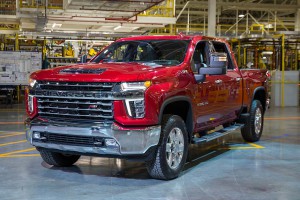Michigan
Two months after shutting down their North American operations due to the coronavirus pandemic, General Motors, Ford and Fiat Chrysler will be permitted to begin reopening their U.S. after getting the nod from Michigan Gov. Gretchen Whitmer on Thursday.
Whitmer said manufacturing in the state could resume as early as May 11, though General Motors, Ford and Fiat Chrysler have set their own targets of May 18, the manufacturers working to put in place a variety of steps aimed at preventing outbreaks of COVID-19, the disease caused by the coronavirus. Prior to the shutdown, dozens of auto workers were infected, with a number of reported fatalities.
“We’re not out of the woods yet, but this is an important step forward,” Whitmer said in a statement. “As we continue to phase in sectors of our economy, I will keep working around the clock to ensure our businesses adopt best practices to protect workers.”
The auto industry has been hammered by the pandemic, with factories in much of the world closed to stop the spread of the disease. Manufacturing has largely resumed in China, albeit at a slower pace than normal. European auto plants have begun reopening and the first factories in the U.S. began to ramp back up starting last week. At the moment, the U.S. manufacturing units of Mercedes-Benz, Kia and Hyundai are back in operation. Other manufacturers have begun laying out their own plans which will largely see most companies up and running before the end of May.
(As America slowly reopens, auto sales could be key to economic recovery.)

Detroit’s automakers have seen stocks of full-size pickups shrink despite the pandemic slowdown in sales.
Detroit’s Big Three originally had hoped for that to happen early in April but had to keep delaying plans as the extent of the pandemic became increasingly apparent. Complicating matters, Michigan has had some of the country’s strictest shelter-in-place restrictions – something that led to a series of protests, including one where heavily armed protestors entered the state capital building.
Officials with the Detroit Big Three said it made little sense to open operations outside of Michigan due to the highly integrated nature of their production networks and the fact that so many of their operations are based in the state. The new order from Gov. Whitmer should make that much easier to accomplish
It remains to be seen, according to industry analysts like J.D. Power’s Tyson Jominy, whether things will go smoothly, however. One of the big concerns is whether all of the industry’s suppliers also will be ready to roll on schedule. Even minor parts shortages could force assembly lines to shut down again.
There’s another issue, said Jessic Caldwell, Executive Director of Insights for Edmunds. “The big question remains if automakers have the appropriate measures in place to guarantee safety for all of its workers as they ramp up production during this new phase. This is completely uncharted territory and the onus is on automakers to get this right the first time so that their employees stay healthy and safe and the industry doesn’t have to repeat this whole shutdown process again.”
(Ford begins shipping respirators to U.S. health care workers.)
In recent days, all three of the Detroit manufacturers have revealed plans to keep workers safe. Ford’s “playbook” includes such steps as taking the temperature of each worker and then issuing them appropriate personal protection equipment, such as masks and face shields. Workspaces have been modified to increase social distancing, where possible, as have common areas like cafeterias and lavatories.
Over the past week, there had been some pushback from the United Auto Workers Union which raised questions about whether the manufacturers were going far enough. But it appears the union is ready to have its workers report in on the 18th.
“As for the start date, the companies contractually make that decision and we all knew this day would come,” UAW President Rory Gamble said in a statement in response to the announcement of the May 18 restart date. “Our UAW focus and role is, and will continue to be, on health and safety protocols to protect our members.”
Other automakers operating in the U.S. have announced similar steps to reduce the risk of new infections, though Sean Suggs, president of Toyota’s big assembly plant in Mississippi, acknowledged during a media webinar last month that “There’s a really good chance we’ll have a positive case again.” The key, he added, will be to prevent an ill worker from inspecting others.
Getting back to work is critical for automakers, as well as auto buyers. Sales collapsed during the first weeks of the pandemic lockdown. But while April demand was off by roughly 50%, that was significantly better than the 80% many analysts had originally forecast, and the market appears to be in “recovery,” said Power’s Jominy. As a result, inventories are starting to grow short, at least for those product lines that remained strong during the national lockdown – full-size pickups, in particular.
(Rental car companies slash new car purchases as travel collapses due to pandemic.)
“The reopening of manufacturing plants should help relieve some pressure for the auto industry, which it desperately needs right now. Pickup truck sales have been the one bright spot for automakers during this pandemic, but inventory is in danger of being in short supply,” said Edmunds’ Caldwell.
The reality is that the start-up will be slow, for Detroit and foreign-owned manufacturers alike.
“We’ve developed these safety protocols in coordination with our union partners, especially the UAW, and we all know it will take time to adjust to them,” said Gary Johnson, Ford’s Chief Manufacturing and Labor Officer, who previously noted the automaker will start out on just a single shift. “We are in this together and plan to return to our normal operating patterns as soon as we are confident the system is ready to support.”
How soon production will reach anywhere near normal, however, is far from certain – as is the question of where auto sales will go in the months ahead. On Wednesday, J.D. Power cautioned that 2020 could see demand as low as 13 million vehicles compared to last year’s new vehicle sales of 17.1 million.



